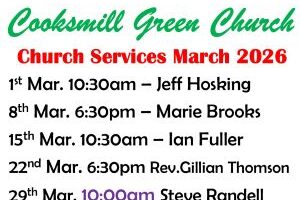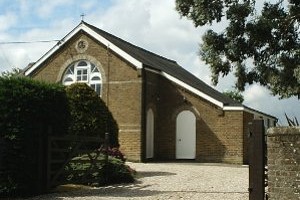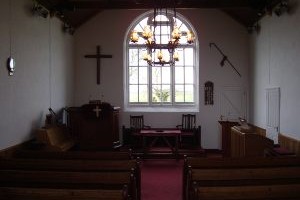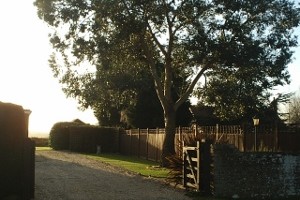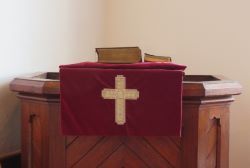Thought for the Month August 2025
“Not not a Christian”
Home (where, as Paul Simon says, my thought’s escaping) figures a lot in the Bible. In the Old Testament, the House of God travelled as a tabernacle with the Israelites as they searched to find and secure a homeland (an ongoing narrative, as we know only too well) where a permanent Temple home for the deity could be established. In the New, it features in three of Jesus’s best known stories – the man who leaves his Jewish friends with their easy prejudices against Samaritans for a difficult journey; the man who leaves his Jewish family and home to experience life in another land; the lamb lost without sheep-nav. I write this having recently watched the BBC series about Pilgrimage. It is easy to mock these spiritual travelogues – like Michael Portillo with a dog-collar – but I have been fascinated by the way in which they encourage participants to face the big questions of the meaning of their lives. Herewith three moments from the most recent series that made me think, and I hope will you.
Some of the most moving points came when the comedy actress Helen Lederer talked of her family. She was christened and her home ethos was generally Christian, but her Czech father was Jewish, and many of her family, she discovered, had died in the concentration camps. She hardly considers herself Jewish and certainly does not follow orthodox practices, yet this link to the past troubles her, and the prospect of the pilgrimage brought the issue to the fore. Thank God if we do not have such a traumatic link to history, but nevertheless I felt the message was the same for us all: who and what we are is partly a product of people some of whom we will know or have known, or heard about; many will be nothing but a name, many more not even that. And this confers responsibilities on us towards them; and if so, then we too have responsibilities to those who come after us, both known and unknown. We tend perhaps to think of our lives in terms of their individual span. The people of both Testaments, including Jesus himself, think more of a past that made them and a future they can – just about – foretell. And, perhaps, so should we.
An encounter thus with my inner Jew was followed by a contact with my inner Moslem in the person of Nelufa Hedayat, adamant she could be nothing else but a Moslem, but who nevertheless expressed her anger in this programme at many things being done in the name of Islam, in particular in her home country, Afghanistan. And this struck a chord with me. I cannot remember a time when I was not a Christian, and cannot imagine not being one, yet almost everything I read in the media about the Church in England makes me angry too. In the weeks around this programme, the papers covered the story of a vicar who sacked her church choir and organist (take note, O world!) and lost almost everyone in her congregation as a result; and the last Archbishop of Canterbury resigned following the Church’s lamentable handling of accusations of sexual abuse. At least he won’t be replaced by the current Archbishop of York who, in his time in Chelmsford, struck me as an uninspiring amalgam of Francis Urquhart and Phil Mitchell. So I am left wondering how far I can be said – or want – to belong to this gang, how much I can accept of the doctrine and dogma and practices of the Church and why I cannot help smiling at the verse of the hymn: “And I hold in veneration / for the love of Christ alone / Holy Church as his creation / and its teachings as his own.” As if.
Perhaps inevitably – certainly predictably – the majority of people on these programmes came under the heading of “agnostic” – a sad word that always makes me think of those who declare themselves “don’t knows” in polls. (How can you be a “don’t know” about Donald, for example?) Their spiritual side can be summarised as thinking there is possibly more to life than meets the eye; that we ought to try to live a “good” life; that something of this life goes on after death. They clearly struggled in this programme, sensing there was a meaning to be found in the pilgrimage but uncertain whether or how to take it further. It is a measure of the failure of our education system – no more school assemblies, no more RE except as the study of arcane myths – and of our churches, which shut their doors in the biggest national crisis of recent years – and of our society in general – that they are given precious little guidance in how to move on into a deeper knowledge of God and truth.
Still, a couple of more encouraging notes to end with. Firstly, Giles Coren, the food critic of The Times; born a Jew but now a regular attendee at High Mass – loving the liturgy, the music, the appeal to the senses – if not necessarily believing in it all. He describes himself as “not not a Christian”. Microsoft Word doesn’t like me typing that, but I love it. So anyone reading this who is not sure, think of yourself not as an agnostic, but as “not not a Christian”. It’s a starting point on the pilgrimage.
And for the end? I turn to Father John Bloomer. I have played for a lot of funerals recently – it hasn’t been a good year for mortality – and I am frequently amazed – or rather appalled – at the way the Church has turned over these services to the family and friends to say what they like regardless of doctrine. Cue references to saintly individuals trampling fields of barley, just out of sight but still around, baking cakes or playing golf in the hereafter. But Father John redressed the balance of sense and taste, saying of one dear departed recently that she was, after life’s pilgrimage, home with God. Home – just so.
Pedantic postscript: to all those who say that punctuation doesn’t matter, if you try to punctuate the title of this Thought any differently, then you change its entire meaning. So yah boo sucks to Bill Gates!
David
